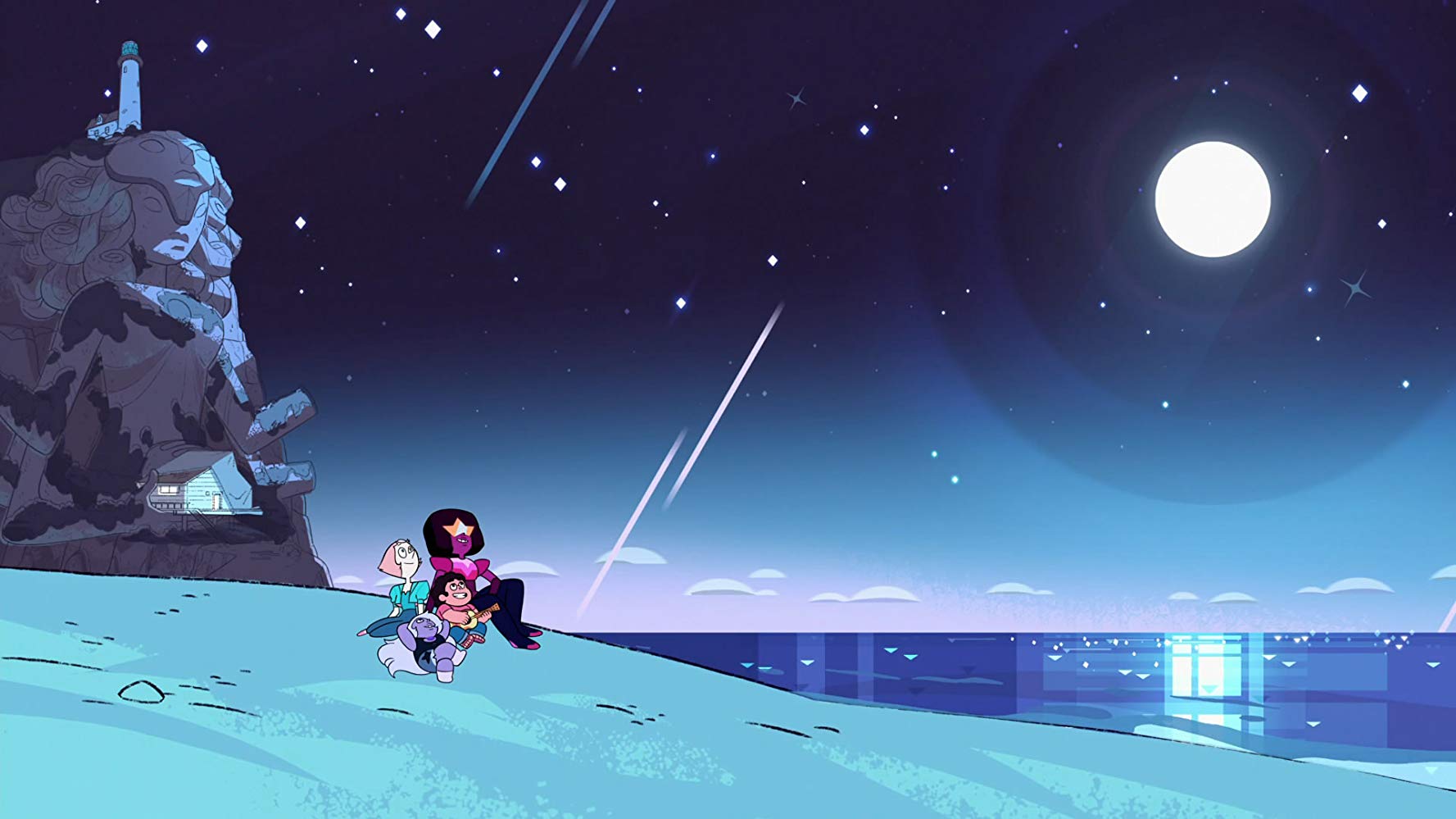
Part Two: Steven Universe and the Diamonds
“Freedom is inherent to the world. To be an individual- whether a human mind or an elementary particle, is to be self-creative. But each individual must create itself out of all that has gone before. Past decisions both provide and limit present possibilities. Within these limits, the future is open. The world is rich with life. The universe does not center around human beings, and we are surely not the only creatures to experience pain and pleasure. ‘Dominion’ has proved a tragic theological model for understanding our ethical relationship to this world. Instead, we must come to see ourselves as participants in a complex and fragile web of relationships in which every creature has some value.”
Process Theology: A Basic Introduction, C. Robert Mesle
This deep dive analysis will contain spoilers for Steven Universe seasons 1-5. Please watch the show before reading any further.
In Part One, we discussed Gems (Rose Quartz, The Crystal Gems, and Pink Diamond) and their relation to Predeterminism, Female Archetypes, and Process Theism. In this section, we will explore the character of Steven Universe. Because this analysis is focused on western monotheism and the story of Jesus Christ, we will discuss the text of the Bible and how it relates to Steven Universe. What is Steven’s purpose? What are his ideals? And what can we learn from him?
Watermelon Stevens: A Microcosm of Worship
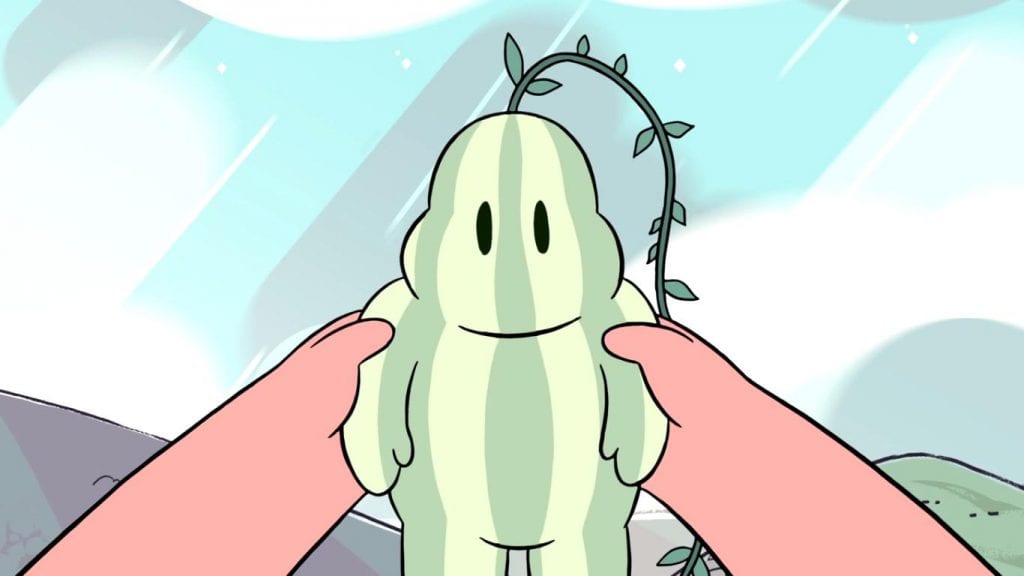
In the season 1 episode “Watermelon Steven,” Steven accidentally creates a race of sentient Watermelons. At first the creatures seem cute and helpless, but when Steven is threatened, the Watermelons become violent. He pleads with them to stop fighting, but they ignore him. Eventually, the most innocent of the Watermelons sacrifices himself to the mob, and he is torn apart by his brethren. Steven banishes the Watermelons, saying:
“Look at what you’ve done! You think I wanted this? You should all be ashamed! He knew this is what it would take to calm your rage. Go! Think about what you’ve done, and don’t come back until you understand what he did for me… for all of us.”
Steven Universe, “Watermelon Steven”
The Watermelons return in “Super Watermelon Island.” In this episode, Steven accidentally possesses one of the Watermelons and discovers that they now worship the sacrificed Watermelon Steven. Watermelon society, though peaceful, idealizes martyrdom, offering up regular sacrifices to Malachite. Steven encourages them to take up arms against Malachite. They defeat her, and all seems well.
In the season 5 episode “Escapism,” Steven once again possesses a Watermelon Steven, but he finds the Watermelon culture much changed. The Watermelons have split off into two tribes, which worship different aspects of Steven’s personality. One of the tribes is peaceful, but dogmatic and obsessed with ritual. The other is war-hungry.
At first, the Watermelons, led by religious leaders, are hostile and unhelpful. But when they are separated from their rulers, the Watermelons pitch in to help build a boat. The chiefs are stripped of their symbols of power. The war tribe’s giant spear is used as a mast. The peaceful tribe’s ceremonial cloak is used as a sail. And Steven, having healed the rift between the two groups, sails to Beach City.
Miracles
“He took the blind man by the hand and led him outside the village. When he had spit on the man’s eyes and put his hands on him, Jesus asked, ‘Do you see anything?’ He looked up and said, ‘I see people; they look like trees walking around.’ Once more Jesus put his hands on the man’s eyes. Then his eyes were opened, his sight was restored, and he saw everything clearly.”
Mark 8:23-25
Steven’s first miracle comes in the season 1 episode “An Indirect Kiss.” In this episode, Steven and Connie share a soda, and Steven’s saliva heals her vision. From that point forward, Steven uses this power to cure humans and Gems, friends and enemies alike. With his magic spit, Steven saves Lapis, partially cures the corrupted Centipeedle, and heals a fractured Ruby soldier.
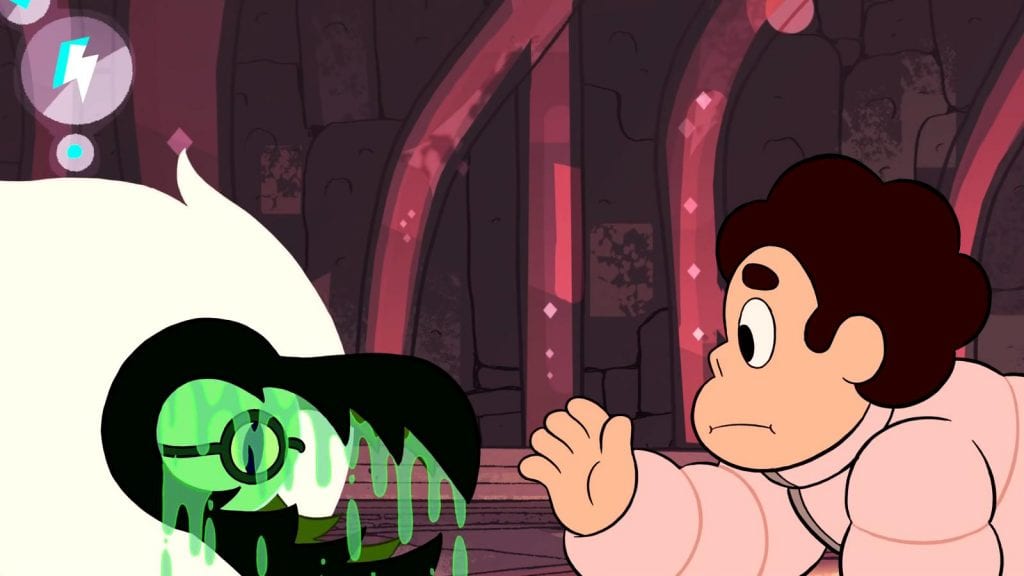
In the Bible, Jesus also utilized the healing power of saliva. In Mark Chapter 7, he rubs his spit onto a man’s tongue to give him the power of speech. He does it again a chapter later, spitting into a blind man’s eyes to make him see.
Another miracle comes in the season 5 episode “Off Colors,” when Lars sacrifices his life to save the off-color Gems of Homeworld. Steven cradles Lars’ head in his hands and weeps. As Steven’s tears touch his skin, Lars’ lifeless body is bathed in a bright, pink light. And suddenly, miraculously, Lars is alive once more.
This scene, of course, calls to mind the resurrection of Lazarus. In John Chapter 11, Jesus learns that his friend, Lazarus, has died. He meets with Lazarus’ sister, Mary, whose sorrow deeply moves him. As he stands outside of Lazarus’ tomb, Jesus weeps. Following a quick prayer, Lazarus lives once more.
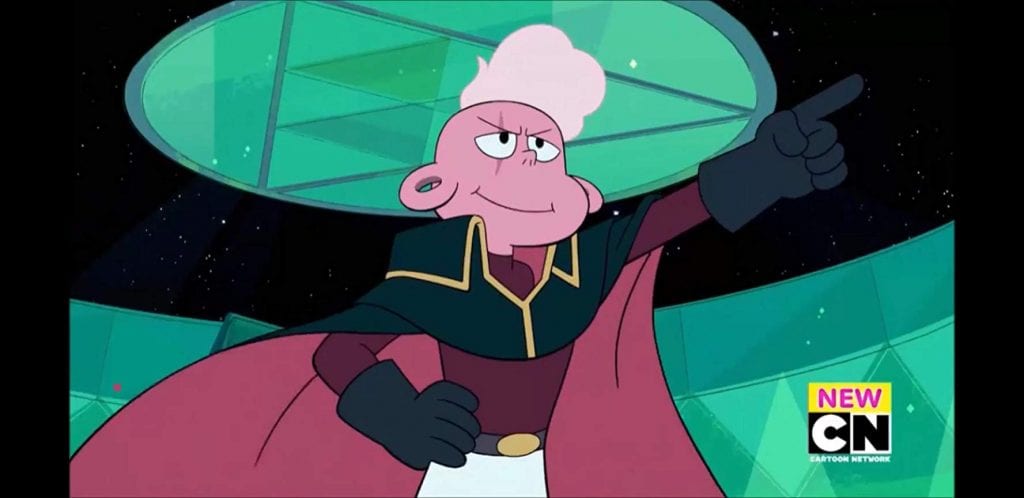
The Power of Love
When talking about Jesus Christ, religious leaders tend to focus on his divinity, but Steven Universe is more interested in exploring humanity. Steven is not a Diamond in human clothing. He is a boy; with a human father, birthed from the womb of Rose Quartz, and blessed with the spark of the divine. In the Christian faith, Jesus’ humanity is often treated as incidental. But if that’s true, then why would an omnipotent God need a human conduit at all?
The answer, according to Steven Universe, is love. Steven was born so that the Gems could experience life on a human level. To teach Pink Diamond, to learn and change. Pink, in her omnipotence, couldn’t comprehend the value of a unique lived experience. She could never hope to truly understand the beauty of finite existence. Therefore, she couldn’t limit her perspective enough to care about the life of a single human being. She loved humans, and she loved Greg. But she could never love him the way a human could.
Like Steven, Jesus could think, feel, and experience life the way a god never could. He burped and farted and spit. He held loved ones in his arms, and he wept for the pain of others.
It’s no coincidence that Steven’s healing powers are tied to his humanity. Steven’s finite existence allows him the freedom to break from preconceptions about what a Gem can and can’t do. He’s not all-powerful, like his mother and the Diamonds. Without the love he feels for those around him, his power would be formless and unfocused, even frightening (as we see in “Change Your Mind”). He may technically be a Diamond, but on the inside, he’s just a child who cares deeply about his family and friends.
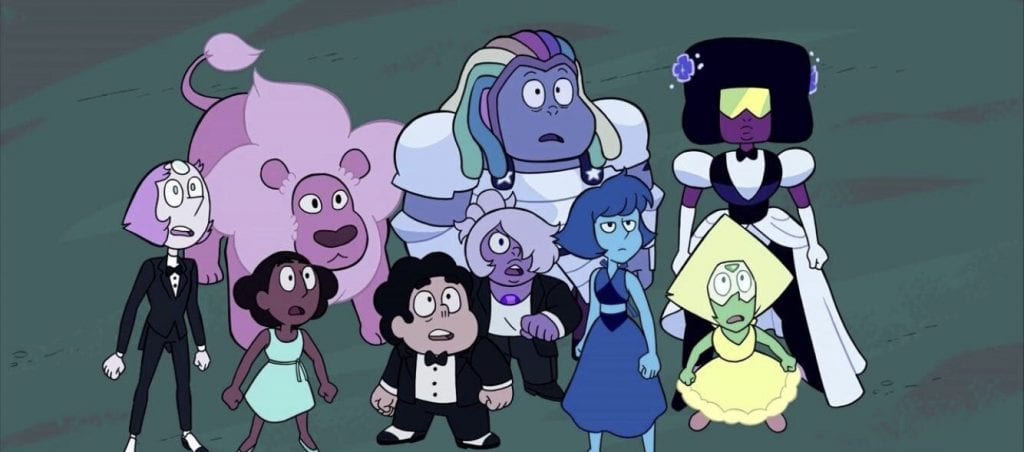
The Zoo
“Now no shrub had yet appeared on the earth and no plant had yet sprung up, for the LORD God had not sent rain on the earth and there was no one to work the ground, but streams came up from the earth and watered the whole surface of the ground. Then the LORD God formed a man from the dust of the ground and breathed into his nostrils the breath of life, and the man became a living being. Now the LORD God had planted a garden in the east, in Eden; and there he put the man he had formed. The LORD God made all kinds of trees grow out of the ground—trees that were pleasing to the eye and good for food. In the middle of the garden were the tree of life and the tree of the knowledge of good and evil.”
Genesis 2:5-9
Steven Universe takes an interesting turn in the season 4 episode “The Zoo.” In this episode, Greg and Steven are captured by the Gems and forced to live in a human zoo. The zoo resembles the Garden of Eden, bountiful and free of suffering, and in it, human beings have thrived for generations. Thus, Steven Universe offers an alternate take on the Garden of Eden story, one in which Adam and Eve were never expelled from paradise.
The human specimens live happy, carefree lives. However, this ease of living comes at a cost. For these humans, every action is determined by a speaker implanted into their ears, which they call the “Little Voice.” The humans, not understanding that they are prisoners, willingly submit themselves to the Little Voice. They feel no pain, nor do they understand sorrow. They have no free will, and so they live comfortable but meaningless lives.
The Inevitable Fall
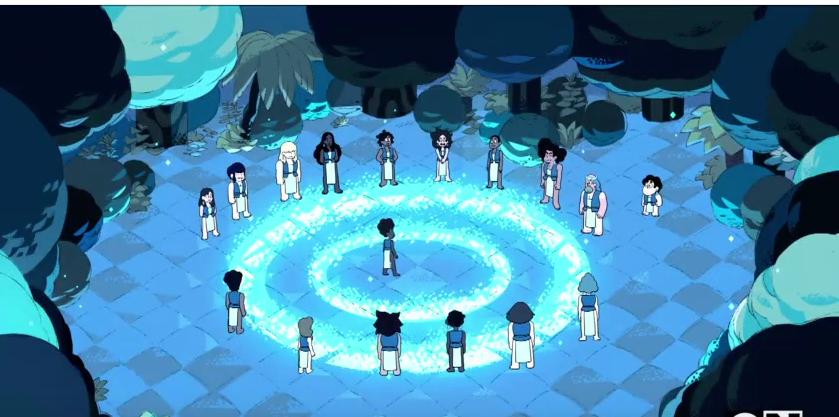
Though Steven finds this placid lifestyle distasteful, Greg seems to enjoy his captivity. At least, until the Choosening. The Choosening is a ceremony in which the Little Voice pairs off the human specimens. Under this system, Greg has no bodily autonomy. If he wants to live in the Garden of Eden, he must give up his free will.
When Abrahamic religions discuss the Garden of Eden, the conversation is often tinged with regret. Adam and Eve were banished from Eden, and so too were their offspring. What if, we wonder, Adam and Eve hadn’t eaten from the Tree of Knowledge? What if we were never cast out of paradise?
Steven Universe posits a different, far more interesting question: What if paradise isn’t that great? Sure, Eden could provide food and shelter and even immortality. But it couldn’t provide freedom. What if Adam and Eve, like Greg, were trapped without free will? The Zoo shows us just how upsetting that reality would be. What is a human without desire, without drive, without hope?
Steven and Greg respectfully reject the uncanny zoo creatures. Genetically, they are human beings, but spiritually, they are an entirely different species. They do not create or invent, imagine, yearn, or love. They are unwitting captives. The Zoo is a prison disguised as a hollow paradise. Would the Garden of Eden be any different? When we look at things this way, The Fall of Man seems less like a preventable tragedy and more like an inevitability.
An Honest Conversation with God
“I know my purpose isn’t to be happy. But I find it harder and harder to enforce your rules when they make me miserable. When they make us all miserable.”
Steven Universe, “Change Your Mind”
At its core, the finale of Steven Universe is about a crisis of faith. Many modern-day worshippers struggle with the strict policies of their respective faiths. They feel left behind by their communities and leaders. Churches and temples, sanctuaries that once offered peace and comfort, start to feel like prisons. Within the walls of holy places, so many feel unwelcome, unwanted, and unloved.
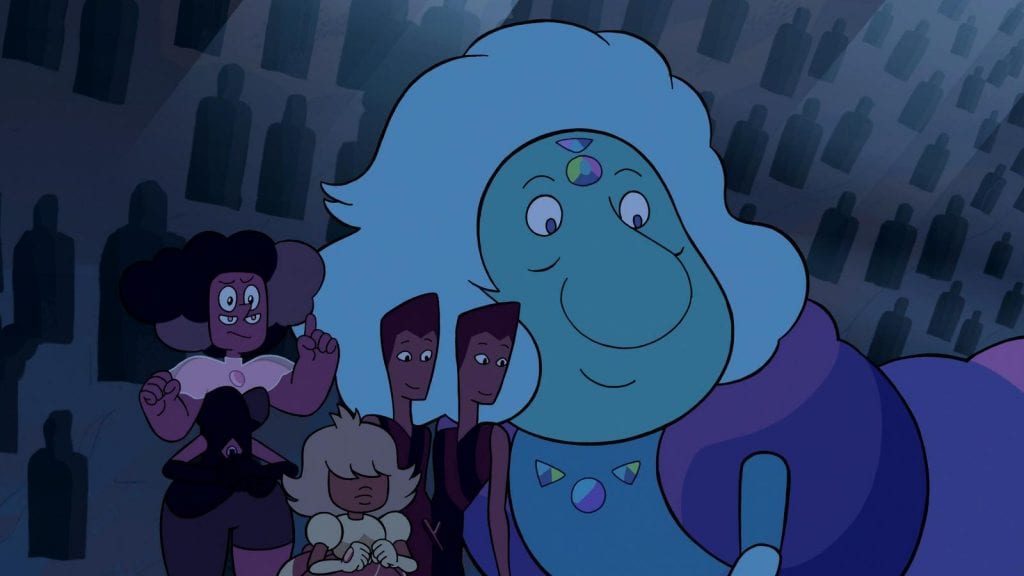
Steven Universe re-frames this crisis of faith as a family dispute; one which will likely feel familiar to some LGBTQ+ viewers. This is where the Jesus allegory takes a new turn. Steven Universe isn’t interested in absolving us of our sins. Instead, Steven sides with the misfits, arguing on behalf of those left behind and cast aside. He confronts the Gods, and chastises them.
In the world of Steven Universe, it is the Diamonds who have something to learn, not the humans or Gems. Steven, as a representative for humanity, Gems, and the Diamonds, is finally able to say what no one else could. People aren’t perfect, and it’s cruel to try to force them to be.
“Does this look perfect to you? My dad says, ‘If every porkchop were perfect, we wouldn’t have hot dogs.’ It means if you try to make this empire perfect, if you just wipe away everything you see as flawed, you lose all the things that make you happy.”
Steven Universe, “Change Your Mind”
The Matriarch
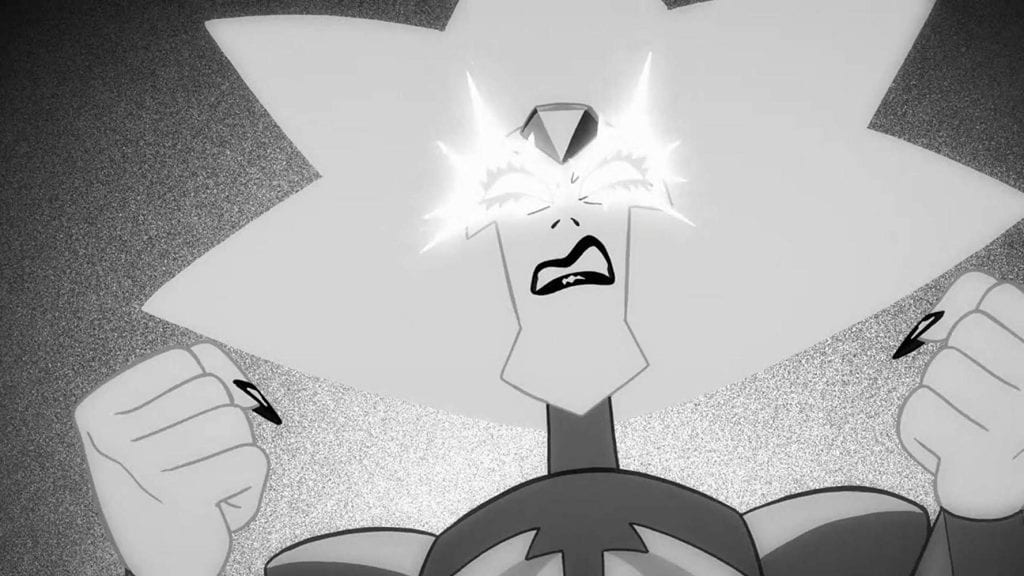
“I only want you to be yourself. If you can’t do that, I’ll do it for you!”
Steven Universe, “Change Your Mind”
White Diamond is an imposing figure. She is cold, manipulative, and dismissive. She believes that her omnipotence grants her unquestioned dominion over all living things throughout the cosmos.
White Diamond’s most terrifying power comes in the form of a blinding stare, which turns Gems white, erasing their identities. She assumes control of them, operating them like twisted puppets. She wants to create the universe in her image, even if it means destroying everything that makes life worth living. Her daughters, Blue and Yellow, are seen as subjects to be controlled. Pink, on the other hand, is treated as an unnecessary nuisance.
“Poor Yellow. She’s so strong, but so weak when it comes to Blue. Ah, and Blue. Her impurities soak up all the warmth in her spectrum. She thinks she needs you, Pink. As for me, I’m certain I don’t need you. After all, I’m every color of the light. But you’re a part of me: the part I always have to repress.”
Steven Universe, “Change Your Mind”
As we’ve already discussed in Part One, Pink Diamond’s power was her sexuality. She was driven by curiosity, pleasure, and love. White Diamond rejects these parts of herself. In the Crystal Gems, she only sees flaws. In Steven, she only sees vice. White Diamond lives a joyless existence, and she expects others to do the same.
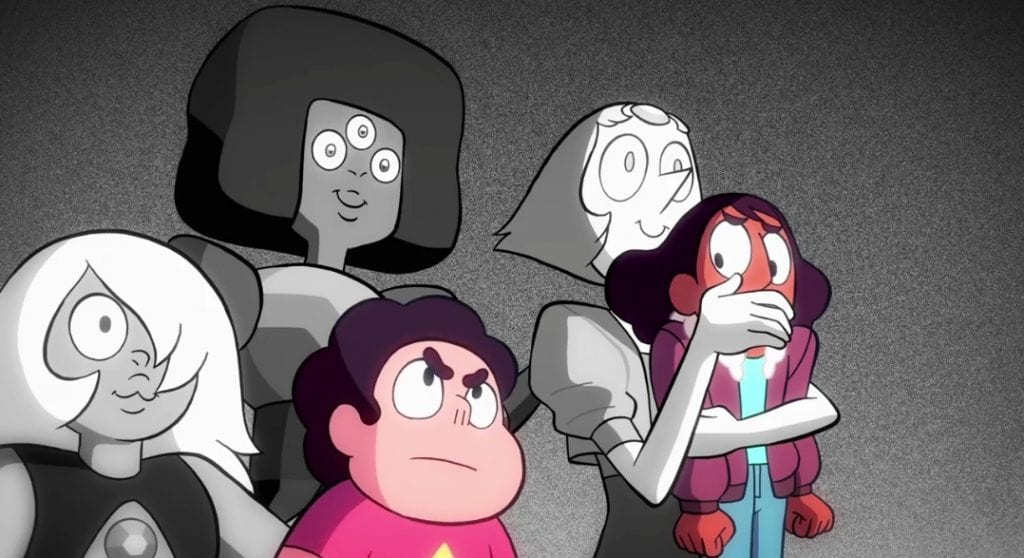
She cannot see Steven and the Crystal Gems for who they really are. She views them as deceivers, interlopers. Not just broken or corrupted, but truly wicked. And so she sets out to cleanse Pink Diamond of her sins. In an act of callous cruelty, she forcefully removes Steven’s gem.
Change Your Mind
“This can’t be happening. I can’t have a flaw. I’m supposed to be flawless. If I’m not perfect, then who am I?”
Steven Universe, “Change Your Mind”
Human beings have a desire to simplify life; to view good and evil in black and white terms, drawing up universal laws. They also love to codify faith. This is how the Watermelon Stevens trap themselves in destructive cycles. Steven arrives, teaches the Watermelons, and then leaves. When left to their own devices, the Watermelons twist the message to suit their needs, and over time, the original intent is lost. Rules and symbols become the objects of worship. Thus, disagreement becomes heresy.
Dogma without love is ultimately destructive. In the quest for perfection, a true believer risks losing their humanity. This is the case with White Diamond. She sacrifices the feeling part of herself, which grants her more power, but leaves her empty.
Steven Universe shows us that perfection is an illusion. Steven’s true power derives from embracing who he is, literally. When he’s reunited with his Gem, he laughs and hugs himself, crying with joy. From that moment on, White Diamond is powerless against him. She bangs her fists and screams at him to stop acting like a child. To which Steven confidently responds, “I am a child. What’s your excuse?”
At these words, White Diamond, for the first time, feels shame. She blushes, her cheeks turning a soft shade of pink. Blue and Yellow gasp at her change of color. She’s no longer flawless. Her power can’t save her. Her empire is meaningless. She doesn’t have the answers. White Diamond is just another imperfect being, like everyone else.
The Legacy of Steven Universe
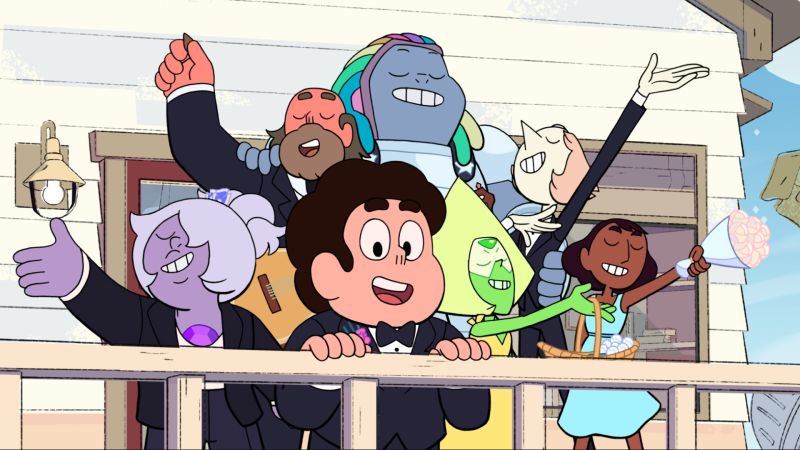
In the end, Steven Universe isn’t actually about a battle with God as much as it is a critique of the way we approach faith and worship.
Steven is undeniably inspired by Jesus and other great spiritual leaders. But he’s so much more than that. He doesn’t lecture us about God and heaven. He leads by example, and he uses his voice to preach about the inherent goodness of humanity. Steven believes that faith is a tool, not a weapon. He argues for kindness, understanding, and freedom above all things. He disregards doctrine and tradition, instead opting for innovation and the dismantling of harmful systems of oppression. Steven believes in love, and he believes in it so much that it’s impossible to disagree with him.
Steven Universe is a force for good in the world. The show’s many subversions and societal critiques are packaged in a pleasant and enjoyable action-adventure story, making it binge-able for children and adults alike. It rewards multiple viewings with unprecedented depth and complexity, daring its audience to speculate and theorize. Steven Universe is honest with its intentions but subtle in its delivery, and it never condescends to its viewers.
Steven Universe could have easily felt contrived and saccharine. Instead, it’s addictively genuine. The show feels like a hug given narrative structure. Its honesty and empathy are reminiscent of other great children’s programming, like Mr. Roger’s Neighborhood and The Muppet Movie. Steven Universe asks us to remember that humankind’s greatest gift is our capacity to love. What if we cast aside our preconceived notions of what is right and good? What if, for just one day, we only think about love?



Recent Comments